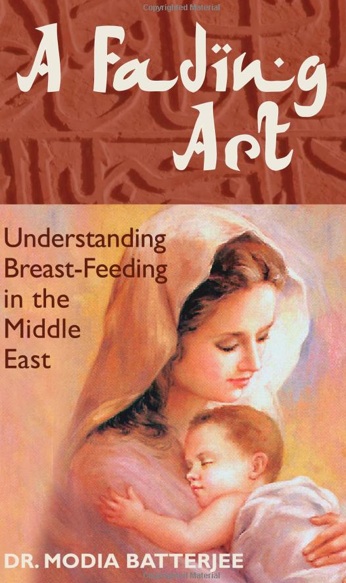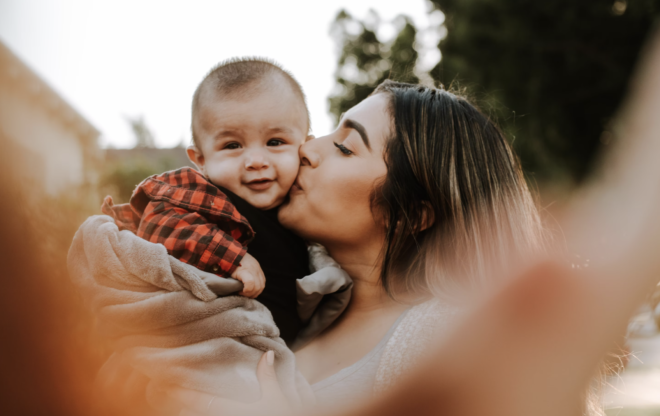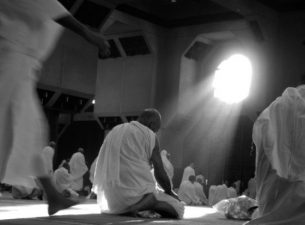Islamic states have the highest infant mortality rate in the world thanks in large part to a decline in breastfeeding. The good news: more women want to breastfeed.
What is a “milk mother” according to Islamic law? Do nursing mothers and pregnant women need to fast during the holy month of Ramadan? And how is it that only 37% of women in Saudi Arabia, “the heart of the Moslem world,” are still breastfeeding at six months, when the Koran requires two years?
I found the answers to these questions and more in A Fading Art: Understanding Breast-Feeding in the Middle East by Dr. Modia Batterjee.
60% of Moslem children died before their first birthday
Batterjee owes her interest in the subject to her mother Anne, a breastfeeding advocate in Saudi Arabia since the late 70’s. In the introduction to her daughter’s book, Anne Batterjee describes the shocking conditions of infants in the Islamic world, including a 20% breastfeeding rate in some parts of Saudi Arabia, that led her to be trained as a Baby Friendly Hospital Initiative breastfeeding counselor and trainer.
Islamic states suffer from the world’s highest rate of infant mortality: According to a 2005 UNICEF report, 60% of Moslem children died before their first birthday, 4.3 million Moslem children die before turning 5 each year, and 1/3 suffer from persistent malnutrition.
UNICEF works to reduce these numbers by supporting breastfeeding. Anne Batterjee lays much of the blame on infant formula companies, who heavily market their products to new mothers and use medical events to promote infant formula to health care professionals.
Saudi women feel pressure to supplement
 A Fading Art opens the book with a fictionalized account of a “typical” Saudi couple expecting their first baby. Both husband and wife are committed to breastfeeding, as required by the Koran.
A Fading Art opens the book with a fictionalized account of a “typical” Saudi couple expecting their first baby. Both husband and wife are committed to breastfeeding, as required by the Koran.
But they know little about it, and the nurse, doctor, and grandmother recommend a bottle of formula at every turn. Batterjee’s account highlights the frustration felt by mothers around the world, who badly want to nurse. “Sarah” senses that she is being given wrong advice, but she is not sure where to go to get correct information. And it is hard for the young withstand the pressure to supplement.
The bulk of the book reports on a study Dr. Modia Batterjee conducted to understand the complex reasons that Saudi women rarely breastfeed exclusively despite recommendations by the World Health Organization to do so for the first six months.
The reasons are similar to those in the western world–employment out of the home, lack of ability to observe other nursing mothers as the extended family structure dissolves, marketing by formula manufacturers, and lack of knowledge by health care professionals. In addition, older Saudi women, who generally do not breastfeed their own children, have a great deal of influence on their daughters’ feeding choices.

Nursing in Europe is not the same as traditional practices that originated in the Middle East
What is a milk mother in Islam?
According to Islamic law, a woman can adopt a baby by becoming his or her “milk mother.” This is defined by giving five satisfying feeds of mother’s milk to a child under two.
Dr. Modia Batterjee helped induce lactation in two young women who had never given birth. With judicious use of Domperidone and Fenugreek to increase supply, along with copious pumping, the women produced enough milk to make 250 cc. of milk, or about 5 feedings.
I found it sad that these women let their milk dry up after going to so much trouble. Perhaps this also tells us something about the status of breastfeeding in Saudi culture.
In western countries, a growing number of adoptive mothers have induced lactation with varying degrees of success.
Batterjee doesn’t mention the controversial fatwas in Saudi Arabia that extended the concept of a “milk mother” to adult males. A woman who breastfeeds a male non-relative of any age would become like his mother and could be alone with her, say for work purposes, without transgressing Islamic law.
Read Part II of Understanding Breastfeeding in the Middle East
Read more on breastfeeding:
World Breastfeeding Week Focuses on Baby-Friendly Policies
Breastfeed Your Baby in a Hijab: Public Breastfeeding in the Middle East
Ten Tips for Breastfeeding Your Baby in Public in the Middle East





Found it – http://www.unicef.org/policyanalysis/files/FactsheetInvesting.pdf
It actually says that about 4.3 million children in OIC countries die from preventable disease and malnutrition by the age of 5, and 60% of THOSE children die in the first year…… NOT 60% of ALL Muslim children.
Even the country with the highest infant mortality rate in the world, Angola, in 1995 only had a rate of 137.90 deaths in the first year per 1000 live births (so, less then 15%), and it is a mostly Christian country. These stats are from the UN.
Asalam alaikum – 60% is an unrealistically high rate.
If you check the infant mortality rates, http://en.wikipedia.org/wiki/List_of_countries_by_infant_mortality_rate, even for 1995 you can see it is far bellow that for even the lowest-ranked arabic country of Yemen, at 78.61 deaths in the first year of live for every 1000 live births.
Saudi Arabi in 1995 had a rate of 22.17 per 1000 live births, ranking them #78 out of 182 countries.
I was unable to find the 2005 UNICEF report mentioned; please provide the documentation. Jazak Allah khair.
Hi Faridah,
Thanks for reading and commenting. The book is available via Amazon.
Assalamualaikum,
Thank you for the good insight of what happening in Middle East.
I am from Malaysia and while we have very low IMR, we are still struggling to incraese our breastfeeding rates.It’s only 14% exclusive breastfeeding at 6 months.
It’s good to hear from your side of story eventho we have different culture but we have one thing in common..Islam.
SO glad I found this website.
Just wondering, where can I get the book by Dr Modia.Really interested to read it.
Thank you
Faridah
To Leah, the death rates of infants quoted in my book are only the ones related directly to infections and diseases that are caused by lack of breastfeeding. These statistics were taken from UNICEF and WHO.
Thanks, Chana, that’s very interesting.
No statistics, this is just based on having done a lot of patient intake interviews. (How do you think I learned the Arabic word for “vaccinations?) At least among the Israeli Arabs I have encountered, vaccination is taken for granted and the mothers are almost all in follow-up with the well-baby clinics. The mothers take advantage of all facilities available to their babies, and there are no eccentric exceptions. I have to admit, their high level of vaccination awareness and involvement surprised me when I first started dealing with Moslem women.
Again, I have to expres my admiration for a breastfeeding culture that is alive and well and thriving. Moslem women are strict about modesty, but no one has to go nurse in the toilet, ever. They nurse discretely, and male relatives are not at all prudish about this. A nursing mother is seen as doing something important and valued.
The young mothers generally have learned about nursing from their female relatives, and they benefit from a supportive network. No one has to crawl off and nurse alone; the nursing mother is not isolated as happens too often in Western cultures.
I am distressed to hear that Saudi society’s identity as a nursing culture is weakening. It would be a terrible loss for so many reasons, especially as many Westerners are, paradoxically, trying to build a strong breastfeeding supportive culture at home.
Thanks, Chana, for your perspective. I thought that there was a low vaccination rate among Arabs in Israel–do you have statistics?
I’m a pediatric nurse at Hadassah, and from what I’ve seen, breastfeeding is much more accepted among Moslems than among Jewish Israelis. The custom of co-sleeping helps encourage nursing mothers to continue nursing, often for the full 2 years, as does the fact that the Moslem mothers are much less likely to take an “all or nothing” approach to breastfeeding. They may supplement with an occasional bottle, especially when the baby is with another female relative, but they are also far more likely to continue nursing after having introduced solid food.
I would also say that Arab Moslem women in Israel are most likely to avail themselves of vaccinations at the Tipat Chalav well-baby clinics here.
Leah, babies in developing countries would probably continue to die at a high rate even if they were breastfeed. Formula feeding can’t take all the blame. But malnutrition and disease can be greatly eased by higher rates of breastfeeding.
As much as we would like to blame formula for all the ills, infant mortality has always been extremely high in Muslim countries.
Just as an example, my husband’s grandmother lost 7 out of the 9 children gave birth to in Yemen during the 40’s. The two to survive were her youngest and they probably survived because the family immigrated to Israel before the oldest turned 2. Once in Israel, she had 9 more kids, of which 2 died (in both cases it was one of two twins) and 7 survived.
Such stories are not uncommon. Before the advent of modern medicine infant mortality was high in Europe and the US too, but I don’t think the figures were nearly as high.